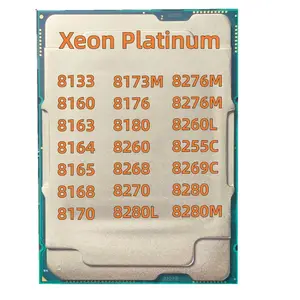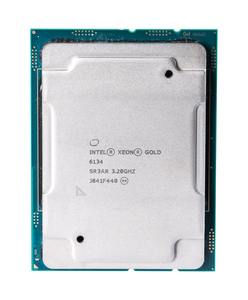(45408 products available)






































































































































































A server CPU is the central processing unit that is designed for use in a server. It is also a microprocessor that processes instructions and performs calculations that are the most critical component that determines the performance of the server PC. It is commonly used in the enterprise data center and other business server systems. A server CPU is typically more powerful and has more cores than a consumer-grade CPU to handle the workload of multiple simultaneous users accessing data, running applications, and performing other computing tasks on the server.
Server CPUs come in different types, which are essential for buyers to understand. These include the following;
Server CPUs are designed to meet the demanding needs of servers in a data center. As a result, they have a more significant number of cores, execute more instructions per clock cycle, and support various server features than regular desktop PC CPUs.
The following table summarizes the features of AMD and Intel server CPUs.
Maximum available cores for multi-threaded processing.
It is available in various core configurations to accomplish parallel tasks efficiently.
128 Threads
Supports 128 CPU threads for simultaneous execution of multiple tasks.
Architecture
14nm Zen 3
7nm Zen 4
10nm
Improve performance and efficiency with the latest design and manufacturing technology.
Max Boost Clock
Up to 5.2 GHz
Up to 4.9 GHz
Up to 5.5 GHz
High clock speed to handle demanding workloads.
Max Cache
280 MB
73.5 MB
60 MB
Massive cache for storing frequently accessed data.
Memory
8-channel DDR4-3200
6-channel DDR4-3200
8-channel DDR4-3200
Support for fast memory access to the server.
PCIe 4.0 Lanes
128 total lanes
64 total lanes
80 total lanes
Support for PCIe 4.0, enabling high-speed data transfer with compatible devices.
Max Memory Bandwidth
204.8 GB/s
140 GB/s
204.8 GB/s
Faster memory access for improved performance.
Socket
WRX80
LGA4189
LGA4189
Server CPU socket type for better compatibility with motherboards.
Integrated Security Features
AMD Infinity Guard
Intel Software Guard Extensions (SGX)
Hardware-enhanced security features for data protection.
Maximum Memory
2 TB
4.5 TB
4.5 TB
Support for large amounts of memory for data-intensive tasks.
TDP
280W
270W
350W
Thermal design power for cooling requirements.
Market
Workstation
Real-time analytics, high-performance computing, and server
Server
Target Audience
Creative professionals
Data center and enterprise
Businesses
Release
2021
2022
2022
Year of release
Server CPUs are vital components of the IT infrastructure. They are used in various industries, from small to large businesses, and are utilized in multiple applications that require heavy computing capabilities. Some common scenarios in which server CPUs are used are as follows:
Data Centers: Server CPUs are the brains of the servers that power data centers. They handle various workloads like cloud computing, big data analytics, and artificial intelligence.
Cloud services: Large cloud service providers like Amazon Web Services, Microsoft Azure, and Google Cloud use many server CPUs to provide infrastructure as a service, platform as a service, and software as a service to their customers.
Web hosting: Websites and web applications are hosted on servers powered by server CPUs. These servers respond to user requests, deliver content, and execute scripts to provide functionalities.
Virtualization: Server CPUs with multiple cores and threads support virtualization technologies like VMware, Hyper-V, and KVM. These allow multiple virtual machines to run on a single physical server, improving resource utilization and flexibility.
Containers: Server CPUs power container orchestration platforms like Kubernetes, which run containers on a cluster of servers. Containers are lightweight and enable quick deployment of applications.
Databases: Data-intensive applications like databases rely on powerful server CPUs to carry out transactions, queries, and data processing. Large organizations may run databases on servers powered by server CPUs.
High-performance computing: Industries like research, finance, and engineering use server CPUs to perform complex calculations, simulations, and modeling for scientific research, algorithmic trading, and product design, respectively.
Streaming: Media companies use server CPUs to power streaming services for delivering audio and video content to users over the internet.
Gaming: Game developers use server CPUs for game development, game servers, and cloud gaming services. Modern games have physics engines, artificial intelligence, and realistic graphics that require powerful CPUs.
Security: Server CPUs support security applications like firewalls, intrusion detection/prevention systems, and encryption. These applications protect data, networks, and systems from cyber threats.
When determining which processor to use in a server, a number of factors should be taken into consideration. The CPU is the heart of a server and is responsible for processing instructions and performing tasks. The following are some of the most important considerations to keep in mind when choosing a server CPU:
Q1: How to choose a server CPU?
A1: To choose a server CPU, the server's intended use should be kept in mind, whether it is gaming, content creation, or a server for virtualization.
Q2: What does a server CPU do?
A2: The CPU (central processing unit) in a server is similar to the CPU in a desktop computer or laptop. It performs the instructions and calculations that are essential to the server's operation.
Q3: How many cores should a server CPU have?
A3: To ensure efficient server operation, select a CPU with at least four cores. This will help the server handle a variety of tasks simultaneously and improve its overall performance and responsiveness.
Q4: Do server CPUs have integrated graphics?
A4: Server CPUs, unlike desktop or laptop CPUs, do not need integrated graphics because servers are usually operated remotely through a network connection and do not require a display output. Therefore, it is important not to mistake one for the other when choosing a CPU for a server.